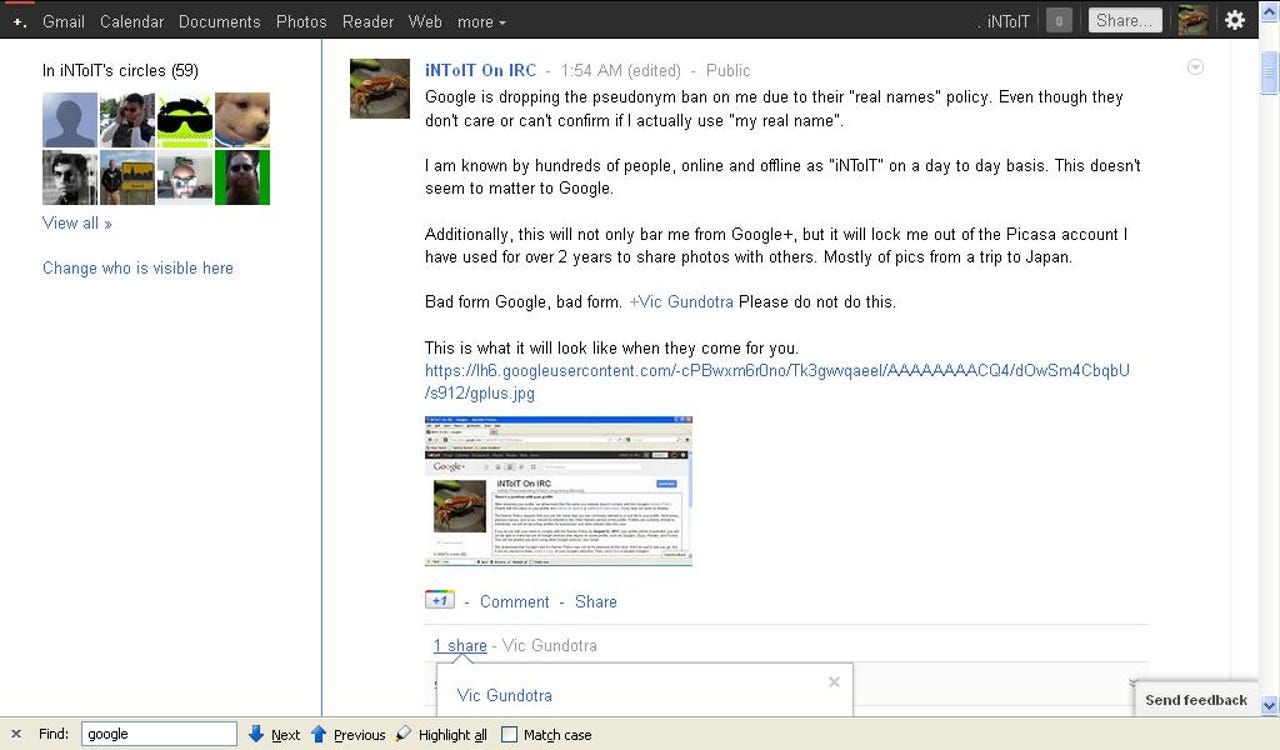Google+ real name clampdown ignores own grace period

One of the major issues currently facing Google+ is the corporate policy requiring the use of real names. Unfortunately, this has raised the ire of many people who prefer to use a pseudonym when using the internet. Google's other services do not have this requirement.
Google has changed their original policy, which was to simply ban the accounts of anyone they decided had a "fake" name, and now provides a four day grace period for users to change their name to one that the Google+ admins find acceptable.
The problem with this is that there are a lot of people who are widely known by their pseudonyms. There are also people whose lives are jeopardized by having their real identities exposed to the world. And in 1995, Supreme Court Justice John Paul Stevens put forth the following in deciding McIntyre v. Ohio Elections Comm’n 514 U.S. 334, 357 (1995):
"Anonymity is a shield from the tyranny of the majority. It thus exemplifies the purpose behind the Bill of Rights, and of the First Amendment in particular: to protect unpopular individuals from retaliation -- and their ideas from suppression -- at the hand of an intolerant society. The right to remain anonymous may be abused when it shields fraudulent conduct. But political speech by its nature will sometimes have unpalatable consequences, and, in general, our society accords greater weight to the value of free speech than to the dangers of its misuse."
The problem gets worse. Even though there is supposed to be a 96-hour grace period, Google is apparently not abiding by it. An acquaintance of mine who goes by a pseudonym, was notified between midnight and 1:50AM on August 19th that he had until August 22nd to change his username. Maybe my math is a little fuzzy here, but that's three days, not four.
After receiving this notification, he expressed his displeasure with a well-written post at 2:00AM on Augist 19th on Google+, along with a request to Vic Gundotra not to ban his account:
It should be pointed out that Vic Gundotra is the Senior Vice-President of Social Business at Google. It should also be noted that he is the driving force behind the real names policy at Google. And it should be noted that his real name is not Vic, it's Vivek.
As you can see from the image above, "Vic" Gundotra shared the post with someone else. It was not shared publicly, so there's no way to tell who it was shared with. What is known, however, is that less than 8 hours after that post my friend found that his account had been suspended.
Even without having all of the behind the scenes information, the account was suspended way before the grace period, which means it had to be done manually. It's apparent that "Vic" Gundotra was well-aware of the post and the user account in question, since he personally used his Google+ account to share it with someone else.
Obviously my friend had a choice about changing his account name on Google+. However, he was not even given the option to exercise that choice. A polite public post, disagreeing with the real name policy, resulted in his account being suspended without being allowed to complete the grace period or to submit a proper appeal. He has since submitted an appeal and changed his account name, but it has not yet been reactivated.
When I contacted Google to investigate, I was told by a Google spokesperson, "We don't comment on the status of an individual's Google+ profile. You can attribute this to a Google spokesperson." Although I do know the name of the spokesperson, I find it ironic that they requested anonymity for the quote.
This is just one of thousands of cases. Celebrities, however, seem to get a free pass. Lady Gaga isn't required to use her real name Stefani Germanotta. Rapper 50 Cent, who has numbers in his stage name, isn't required to use his real name Curtis Jackson. Apparently regular people don't have the same rights and privileges as celebrities.
In addition to this, the determination process is completely arbitrary. If someone at Google decides that a name doesn't sound real, they can flag it for violation of the policy. Don't believe me? Ask fellow ZDNet columnist Violet Blue about her notification that her legal name was in violation of the Google+ real name policy.
Violet actually has some gravitas attached to her name. Maybe not a big-league celebrity like Lady Gaga, Violet is actually a well-known author. Violet proved her identity, and the situation proved embarrassing to Google VP Bradley Horowitz during an interview with Tim O'Reilly. Bradley Horowitz says they fixed that case, but there are many more, and Bradley Horowitz is not the driving force behind this policy and its implementation. "Vic" Gundotra is.
Blogger and tech evangelist Robert Scoble recently had a conversation with "Vic" Gundotra about the real name policy. Scoble is a former employee of Microsoft, and used to work for Gundotra. "Vic" admitted that he doesn't use his legal name, and that the issue isn't even about real names, just real-sounding ones.
He also said that they're working on a psedonym system, but there are so many other tasks to be dealt with that it won't happen immediately. And yet they were really in a hurry to implement this real names policy and write an automated system--which can be manually overridden--to disable user accounts based on arbitrary decision-making.
I think this post from Chris Bridges sums it up best. It's snarky and sarcastic, but it cuts to the heart of what is wrong with the real name policy and the way it's been implemented.
Up until this point, early adopters were singing the praises of Google+, myself included. But this policy has turned off a lot of supporters. This is the kind of corporate decision that can kill a service like this before it can really gain traction.
It's my belief that the hardcore engineering mentality at Google works at cross purposes with social media. Their previous failures with Buzz and Wave bear this out. Google finally came up with an elegant, easy to use service, and they may end up killing it by ignoring the many complaints from the people actually using it.
